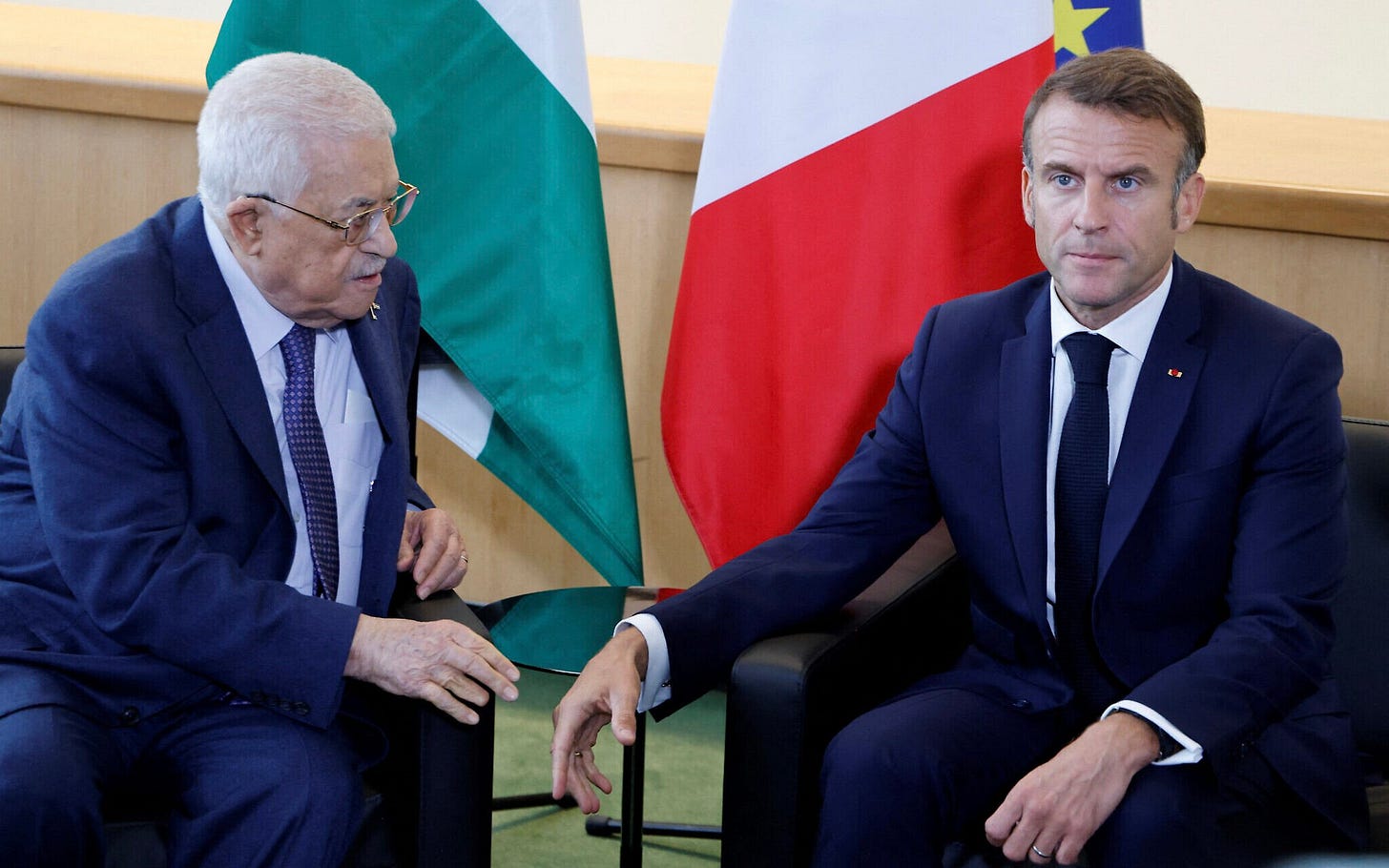Is Recognizing a Palestinian State a Good Idea?
French President Emmanuel Macron’s recent announcement that France would recognize Palestine in September set off the predictable waves of praise and teeth gnashing, depending on the audience. The Israeli government and pro-Israel types are against; the U.S. Government is dismissive; “progressives” and just about anyone to the Left is ecstatic.
Macron and Palestinian Authority leader Mahmoud Abbas.
I am, unsurprisingly, against, but I think it important to think this through rather than be satisfied with a knee jerk response. The thing is, I am not against recognizing a Palestinian state in principle. I am not against the establishment of a Palestinian state. I have always believed the so-called “two state solution” (2SS) offers the best chance for a long-term solution. Or maybe it’s just the least bad option: The fantasy pushed by the Peter Beinarts of the world of a single state with everyone enjoying equal rights in a liberal utopia is just that, a fantasy. Worse, it is a recipe for violence, terrorism, and very likely the destruction of Israel or at least its Jewish community. Beinart doesn’t care because he is an apostate who would sacrifice Jews and Judaism on the altar of his alleged humanism—but I digress. Similarly, a single state that does not extend full civil rights to all its non-Jewish denizens would be untenable, if only because of demographic trends. It could survive only through violence that, over time, would grow in brutality yet lose its efficacy. For similar reasons, the current status quo is untenable over the long term, and there is a real danger that the West Bank could end up like Gaza. Would a 2SS work? In theory, at least, it could. It might. “If you will it, it is no dream.” But its viability would depend on many things, and for that reason alone I dismiss simplistic calls to “end the Occupation” or prematurely recognize “Palestine” as a state, even while I regard the latter as a worthy project.
Macron’s statements about recognizing Palestine are remarkably free of details, which really is the whole problem. He’s evoked the idea of recognizing Palestine without addressing basic questions such as what state? What government? What boundaries? What even is Palestine? The Palestinian Authority (PA) ostensibly rules over some of the West Bank, although it is notoriously corrupt, inept, and unpopular. It is led by the 89-year old Mahmoud Abbas, who last stood for election in 2005. Many commentators believe there have been no elections in the West Bank since 2005 precisely because Abbas and his Fatah party assume they would lose to Hamas. What about the Jewish settlements in the West Bank? I am no friend of theirs, but they exist, and many people live in them. Their status in a future Palestinian state is a tricky question. Not an unresolvable question, but one that cannot be dismissed as trivial. The matter can only be settled by means of long and politically difficult negotiations.
As for Gaza, Hamas expelled the PA in 2007. Recognizing the PA as the government of a sovereign Palestine would not apply to Gaza. It would be helpful if the PA were in charge of Gaza, but unfortunately Israel’s right-wing coalition has ruled out installing the PA in Gaza precisely out of fear that it would encourage the emergence of a Palestinian state. That said, the PA’s tenure in Gaza before its ouster could hardly be called a success.
What is Palestine?
Limiting the discussion to the West Bank and Gaza is problematic. Perhaps in Macron’s eyes, “Palestine” is the West Bank and Gaza. That’s also true of many well-intentioned Western Liberals, for whom “end the Occupation” means “end the Occupation of the West Bank and Gaza.” Yet the chant “From the river to the sea” serves as a reminder of the reality that for many Palestinians (how many?), “Palestine” equals the entirety of the former British Mandate referred to as Palestine, and Jews have no legitimate claim to any of it. This is true for Hamas, which has no patience for any 2SS and explicitly aspires for genocide and the destruction of the entirety of the Jewish state. They can abide Jewish sovereignty over not one inch of land they believe is Islamic.
As for Abbas and Fatah, the issue regrettably is unclear. Yes, Abbas’s predecessor, Yassir Arafat, at Camp David signed accords acknowledging Israel’s existence and committing the Palestinian national project to co-existence. Fatah dropped the destruction of Israel from its explicit objectives. Abbas follows this line. Moreover, there are plenty of concrete examples of positive cooperation between the Israeli government and the PA, and between the Israeli military and PA security services. On the other hand, Israelis have good reason to be distrustful, and to fear that Arafat only recognized Israel and agreed to peace as a temporary measure. One of those reasons is Arafat’s subsequent rejection of Israeli proposals for a final settlement in 2000 and 2001 that would have led to a 2SS. Another is Fatah’s involvement in terrorist attacks in 2002-2005, including suicide bombings of buses and the massacre of people celebrating a Bar Mitzvah in 2002. Arafat, unlike, say, George Washington, David Ben Gurion, or Nelson Mandela, seemed incapable of making the transition from rebel and freedom fighter to statesman and nation builder.
The whole point of the Oslo Accords was to advance toward Palestinian independence though a series of phases intended to build mutual confidence. Israelis needed to convince Palestinians they were earnest about a 2SS, which would require reining in Israel’s far-right. Palestinians needed to convince Israelis they were over the maximalist dream of expelling Jews from “Palestine” and were ok with the 1948 borders, more or less. They needed to convince people that “Free Palestine” does not equal “kill the Jews.” Oslo failed, unfortunately. There’s plenty of blame to go around, though it must be acknowledged that Hamas led the charge in sabotaging Oslo through its terrorist attacks of the 1990s and 2000s, which led directly to Netanyahu’s electoral success and the collapse of the Israeli Left. This precisely is why Arafat’s preference for getting into the suicide bombing game during the Second Intifada was so devastating: Arafat might have saved Israel’s Left by reassuring the Israeli electorate about Palestinian intentions, notwithstanding Hamas’s nihilism. Unfortunately, in the immortal words of Abba Eban, Palestine’s leaders have “never missed an opportunity to miss an opportunity.”
(We can say the same about Abbas’s tepid responses to 7 October. Israeli Arab leaders prudently and, I think, sincerely responded by expressing solidarity with their grieving Jewish neighbors and making clear that whatever their feelings toward the Jewish state, the massacres and gang rapes of 7 October were beyond acceptable. I believe Israeli Jews took note. These things matter. They certainly took note of Israeli Druze’s unequivocal solidarity post-7 October, which helps explain the Israeli public’s interest in intervening in Syria on behalf of Druze interests. In contrast, Abbas’s statements about 7 October and the resulting war perhaps can best be described as “equivocal” or even “unimpressive” from any point of view.)
Rewarding 7 October
In addition to the above-mentioned problems with recognizing a Palestinian state, or at least with recognizing one now before many issues are worked out, there is the fact that Macron reportedly decided to make this move after a visit to the Gazan border, and in response to the humanitarian crisis there. Macron therefore appears to be rewarding Palestinians for a war they started on 7 October, and refuses to end by releasing hostages or surrendering. Of course, Hamas absolutely does not want the Palestinian state Macron almost certainly has in mind. Macron wants two states, not a single, Judenrein one. But Macron is pretending Palestine = the PA, and that Hamas can be overlooked. Can it? Hamas, meanwhile, even though it does not share Macron’s vision, nonetheless probably considers Macron’s statement a victory. It is a step forward in the long-term effort of isolating Israel and limiting its liberty of action, all for the purpose of weakening it and, eventually defeating it.
The Devil is in the Details
Any discussion of where Palestine’s borders might be inevitably runs hard against the conundrum of Jerusalem, which is the number one reason why precipitous recognition of a Palestinian state makes no sense. Sharing Jerusalem, in principle, is a nice idea, but how does that really work? Who is in charge? Who keeps order? Some neighborhoods could be carved up without too much fuss. Many and probably most residents of any faith are cool with coexistence and sharing. Arabs are not unusual sights in the city’s majority-Jewish neighborhoods, even if they are only there to shop or work. The last time I was there, I noticed the large numbers of young women wearing hijabs serving ice cream to mixed customers, or working as pharmacists behind the counters of pharmacies in Jewish neighborhoods. Unfortunately, there are points of friction. Lighting rods. And people who feel very strongly about them.
Muslim woman shopping in West Jerusalem’s Mamila Mall.
The biggest of them all is the Temple Mount: The Dome of the Rock and Al Aqsa Mosque are built (deliberately) atop the holiest site in Judaism; Jerusalem itself is and has been for millennia the focal point of Jewish religious practice and national identity. It is mentioned directly or indirectly in virtually every Jewish prayer of any length, and evoked dozens of times each day by the religiously observant. Jews know well that Jerusalem’s past Muslim rulers restricted Jewish access to holy sites and constrained religious observance. In 1948, the Jordanian Army, led by British officers, ethnically cleansed the Old City’s Jewish quarter and destroyed all but one of the 35 synagogues there. Giving up sovereignty over East Jerusalem or at least the Old City is a concession Israelis are unlikely to agree to. Can Palestinians accept that? Could some novel arrangement be worked out? Possibly. I hope so. But in any case, coming up with mutually acceptable settlement would take far more than a speech by Emmanuel Macron.
If you like this content, please consider a paid subscription to support my work. Or even just Buy Me a Coffee. Thank you.





